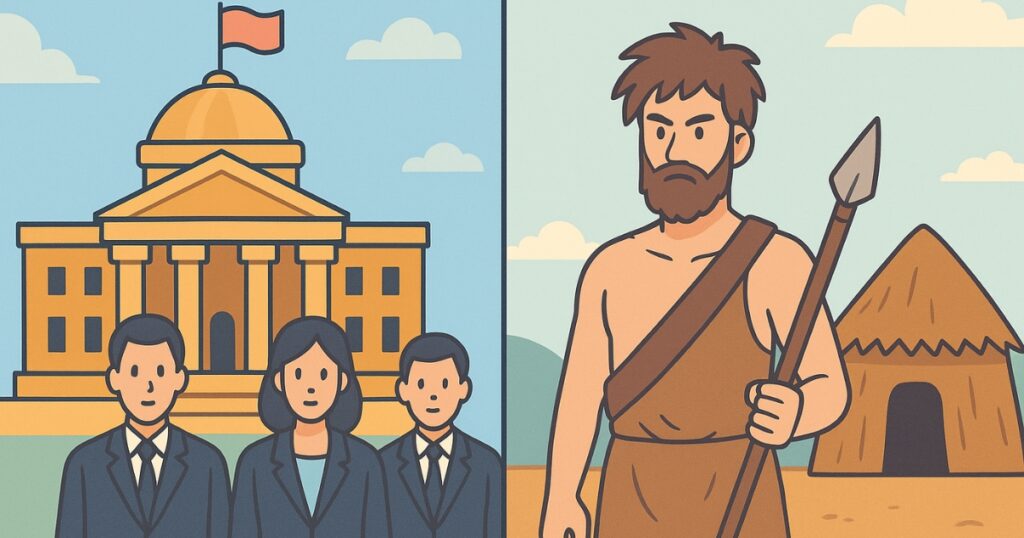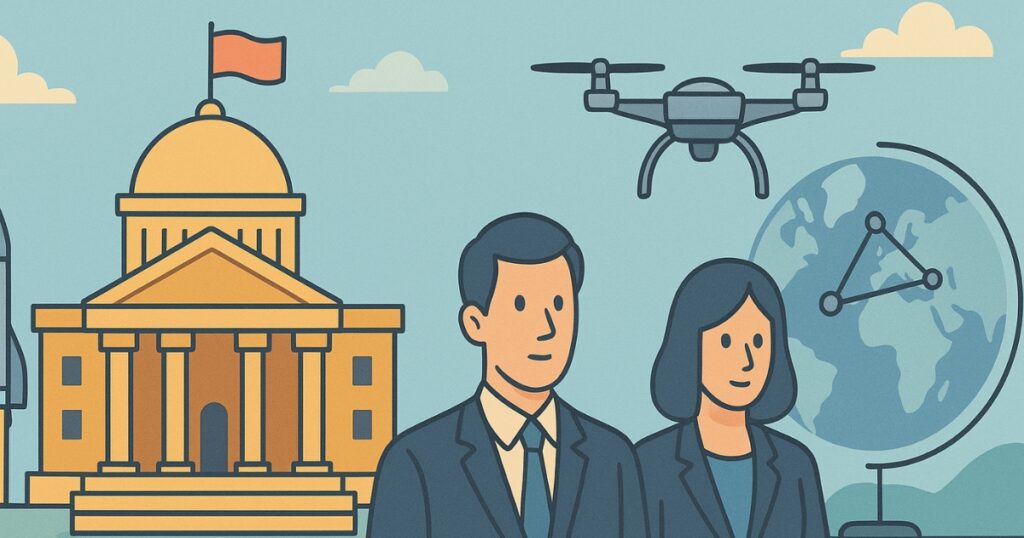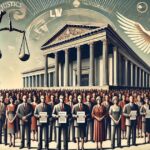Necessity of the State in human life, its origin, functions, and role in ensuring security, justice, welfare, and social harmony. Learn why the State remains essential for modern society and human progress.
Human beings are social creatures who cannot live in complete isolation. Since ancient times, people have lived together in groups, communities, and societies to fulfill their needs and ensure survival.
However, whenever people come together, questions of order, authority, justice, and cooperation naturally arise. To resolve conflicts, protect individual rights, and ensure the welfare of society, the concept of the State emerged.
The State is not just a political organization but also a fundamental institution that regulates human behavior, ensures peace, and creates conditions for development.
Without the State, human life would be chaotic and insecure. In this blog post, we will deeply discuss the necessity of the State in human life, its functions, theories justifying its existence, and its modern-day relevance.
The Concept of the State
The term “State” is derived from the Latin word status, meaning condition or existence. A State may be defined as a politically organized body of people occupying a definite territory, with a government that is sovereign both internally and externally.
According to political scientists like Aristotle, the State is a natural institution that exists for the sake of achieving the highest good. Modern definitions, such as those given by Max Weber, focus on the State’s monopoly over legitimate force and authority.
In simpler terms, the State is the supreme institution of political authority that governs society, protects individuals, and promotes collective welfare.
Historical Background of the State
The idea of the State has evolved throughout history.
Primitive Societies: In early tribal communities, leadership was informal, and rules were based on customs and traditions.
Ancient Civilizations: States like Egypt, Mesopotamia, and Greece emerged with organized governments and codified laws.
Medieval Period: Feudalism dominated, where power was decentralized, and kings, nobles, and the Church shared authority.
Modern State: The Treaty of Westphalia (1648) marked the beginning of the modern nation-state with sovereignty and defined territorial boundaries.
This gradual evolution highlights the fact that humans cannot sustain social life without organized authority.
Theories Explaining the Necessity of the State

Several theories justify why the State exists and why it is necessary in human life:
Divine Origin Theory – States that rulers are chosen by God to govern people. Though outdated, it played a crucial role in early civilizations.
Social Contract Theory – Thinkers like Hobbes, Locke, and Rousseau argued that the State was created through an agreement among individuals to escape the “state of nature.”
Hobbes believed the State was necessary to prevent chaos.
Locke saw the State as essential to protect natural rights—life, liberty, and property.
Rousseau viewed the State as a product of collective will for freedom and equality.
Force Theory – Suggests that the State was created through conquest and force.
Evolutionary Theory – Argues that the State evolved gradually from the family, to clans, to tribes, and finally into complex political organizations.
Necessity of the State in Human Life
The necessity of the State can be explained under different aspects:
1. Ensuring Security and Protection
The most fundamental necessity of the State is the protection of individuals from internal and external threats.
Without a State, society would face anarchy, violence, and insecurity.
Police, military, and judicial systems ensure law and order.
2. Regulation of Rights and Duties
The State guarantees rights such as freedom of speech, right to equality, and right to property.
It also enforces duties like obeying the law, paying taxes, and respecting others’ rights.
3. Administration of Justice
Conflicts are inevitable in society. The State provides courts and legal systems to ensure fair justice.
Without impartial authority, personal disputes could lead to revenge, violence, or civil war.
4. Economic Stability and Development
Modern States play a vital role in economic regulation, infrastructure development, and employment generation.
Welfare measures like healthcare, education, and poverty alleviation are provided by the State.
5. Social Harmony and Unity
The State integrates diverse groups, religions, and cultures under a common national identity.
It reduces discrimination and works toward inclusive development.
6. Promotion of Education and Culture
By providing schools, universities, libraries, and cultural institutions, the State enriches human life.
It protects heritage, traditions, and promotes innovation.
7. Environmental Protection
In the 21st century, environmental challenges like climate change and pollution highlight the importance of State intervention.
Laws regulating industries, forest conservation, and renewable energy initiatives are essential for sustainable living.
The State vs. Stateless Life:

Let us imagine life without the State:
There would be no law to define rights and duties.
Might would become right, with the strong dominating the weak.
Conflicts would be resolved through personal revenge, leading to endless cycles of violence.
Trade, commerce, and economic development would collapse due to lack of regulation.
Human life would return to what Hobbes described as “solitary, poor, nasty, brutish, and short.”
This comparison makes it clear that the State is indispensable for organized and peaceful living.
Role of the State in Modern Society
In the modern era, the role of the State has expanded beyond security and justice. Some key roles include:
Welfare Functions – Providing healthcare, housing, education, and social security.
Regulatory Functions – Ensuring fair trade, consumer protection, and labor rights.
International Relations – Representing the nation in global politics, treaties, and organizations like the UN.
Technological Development – Supporting research, digital infrastructure, and innovation.
Crisis Management – Handling natural disasters, pandemics, and economic crises.
Challenges Faced by the State
While the necessity of the State is undeniable, modern States also face several challenges:
Corruption – Misuse of power undermines trust in governance.
Terrorism and Cybersecurity Threats – New-age dangers demand advanced security measures.
Globalization – National sovereignty is sometimes compromised by global forces.
Inequality – States struggle to balance wealth distribution and social justice.
Environmental Crisis – Sustainable policies are needed to combat global warming and biodiversity loss.
These challenges prove that while the State is necessary, it must constantly adapt to changing times.
Philosophical Perspectives on the State
Aristotle: Described man as a “political animal” who naturally lives in a State.
Plato: Believed the State should ensure justice and moral development of individuals.
Hobbes: Argued for the absolute authority of the State to avoid chaos.
Locke: Advocated limited government focused on protecting rights.
Rousseau: Emphasized collective will and democracy.
Karl Marx: Criticized the State as a tool of class oppression, advocating for a stateless, classless society.
These diverse views show that while thinkers may disagree on the nature of the State, none can deny its necessity.
The Future of the State:

In the age of globalization, digitalization, and artificial intelligence, the role of the State is transforming.
While multinational corporations, international organizations, and civil society groups play a significant role, the State remains the ultimate authority.
In the future, the State must:
Strengthen democratic values.
Embrace technology for transparent governance.
Address global challenges collectively while preserving sovereignty.
Balance individual freedom with collective responsibility.
You can also read: Liberal Perspective of the State.
Conclusion:
The necessity of the State in human life is unquestionable. It is the backbone of organized society, ensuring peace, justice, security, and development.
From ancient tribal groups to modern nation-states, history shows that humans cannot sustain collective life without some form of political authority.
The State provides protection, regulates rights and duties, administers justice, promotes welfare, and fosters unity.
While challenges such as corruption, inequality, and globalization persist, the State remains the cornerstone of civilization.
As Aristotle rightly said, “He who is unable to live in society, or who has no need because he is sufficient for himself, must either be a beast or a god.” This timeless wisdom reminds us that human life, in its truest form, is possible only within the framework of the State.
FAQs:
1. What is the meaning of the State in political science?
In political science, the State refers to a political organization with a defined territory, population, government, and sovereignty that regulates society and ensures law, order, and justice.
2. Why is the State necessary for human life?
The State is necessary to maintain law and order, protect individuals, safeguard rights, resolve conflicts, and promote welfare and development. Without it, society would face chaos and insecurity.
3. How did the concept of the State evolve historically?
The State evolved gradually from primitive tribal groups to organized ancient civilizations, through feudal societies, and later into modern nation-states after the Treaty of Westphalia in 1648.
4. What are the main functions of the State?
The main functions of the State include maintaining security, ensuring justice, protecting rights, regulating the economy, promoting education and welfare, and fostering unity among citizens.
5. What would life be like without the State?
Without the State, there would be no laws or authority, leading to disorder, insecurity, and conflict. Human life would resemble what Hobbes described as “solitary, poor, nasty, brutish, and short.”
6. What are the major theories explaining the origin of the State?
The major theories are: Divine Origin Theory, Social Contract Theory (Hobbes, Locke, Rousseau), Force Theory, and Evolutionary Theory.
7. How does the State ensure social welfare today?
Modern States provide education, healthcare, social security, employment schemes, and infrastructure to improve the quality of life for their citizens.
8. What are the challenges faced by modern States?
Modern States face challenges such as corruption, terrorism, cyber threats, inequality, globalization pressures, and environmental issues.
9. What role does the State play in democracy?
In democracy, the State ensures citizens’ participation in governance, protects fundamental rights, upholds the rule of law, and promotes equality and freedom.
10. Will the State always remain necessary in the future?
Yes, despite globalization and technological advancements, the State will remain essential in regulating authority, ensuring security, and addressing global challenges such as climate change and digital governance.










